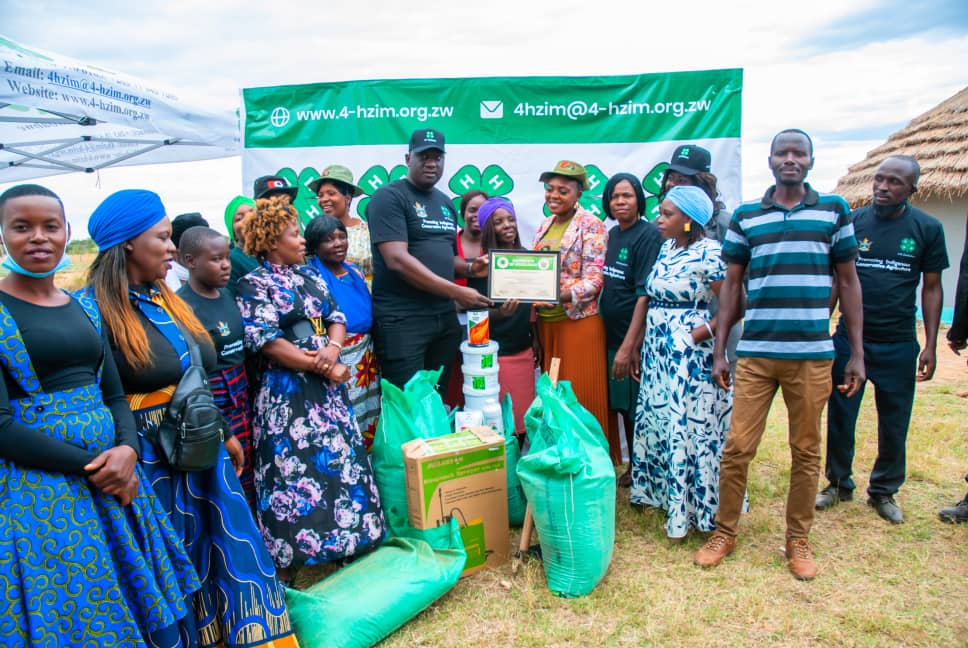|
Getting your Trinity Audio player ready…
|
By Staff Writer
For 32-year-old Seke rural district widow Tatenda Mishi, winning the champion farmer award for the year 2022 over the weekend was a dream come true.
She believes it was criticism from people in the neighborhoods at the beginning of her farming journey which pushed her to work hard and reap the fruits.
“All I can say is as a widow no one believed me and my capabilities as a farmer, I remember I was demotivated by a lot of people previously when the garden project started but I thank God that even pushed me to work hard,” said Mhishi.
Her husband died and left her with three children whom she has been working around the clock to feed. Mhishi is amongst the estimated over 70 percent of the country’s population which depends on agriculture for their livelihoods.
She is one of the beneficiaries of the farming programming by 4-H Zimbabwe Foundation in partnership with the Ministry of Lands, Agriculture, Fisheries, Water and Rural Development which aims at capacitating women in the rural and marginalized areas with modern-day farming techniques to survive climate change effects.
The project is establishing solar-powered gardens in rural areas and placing women in groups to farm in these gardens, each individual apportioned her land inside the garden.
On Saturday the initiative saw women farmers who are affiliated with the program in Seke district meeting for their Young Women Capacity Building annual awards ceremony which was graced by the District Women’s Quota Member of Parliament, Honorable Tatenda Matevera.
“I am happy to have been recognized as a champion farmer for the year 2022. This award means a lot to me,” she said with tears of joy streaming down her face after winning the top champion farmer award.
She said other than winning the award, the project has helped to sustain herself and her family as a small-scale farmer as she has been empowered to practice climate-smart practices and post-harvest management.
“As we speak through this initiative by 4-H, I am able to send my children to school because they have empowered me on the best methods I can use from time to time as a small-scale farmer in adapting to climate change, so I am active all year round.
“We used to rely on seasonal rainfalls but now it is a different case. The partners have empowered us with irrigation schemes and we have farming projects running throughout the year.
“My life as a widow has been improved through farming. I can now cater to my children’s needs. I sell my agricultural produces and earn myself money,” she added.
According to the Food and Agriculture Organization of the United Nations (FA), smallholders and family farmers are increasingly struggling to make a living from their land and labour due to climate change.
Other than the change in seasons of mother nature, they are said also to have limited or no access to rural financial services to empower their farming activities.
“The prevailing harsh climate change has resulted in low rainfall and such gardens will enable women to have sustainable projects continuously throughout the year for sustainable livelihoods,” said John Muchenje who is the director of 4-H Zimbabwe.
His organization is advocating for climate-smart agriculture adaptation to climate change and is working with young women farmers in Zimbabwe’s rural communities since 2019.
They are facilitating the drilling of solar-powered boreholes, tanks, and drip irrigation kits to most of their affiliates who are now into small-scale farming.
They have also partnered with Empower Bank to capacitate these rural farmers and also help them with financial literacy.
As of today, 4-H Zimbabwe has managed to establish 8 women-led solar-powered community gardens in areas like Hurungwe District in Mashonaland West Province. They have vowed to expand the initiative in all rural communities across the country by 2025.
